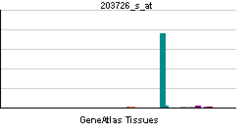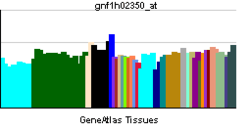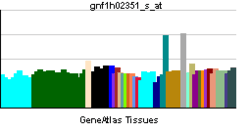Laminin, alpha 3
| View/Edit Human | View/Edit Mouse |
Laminin subunit alpha-3 is a protein that in humans is encoded by the LAMA3 gene.[4][5]
Function
Laminins are basement membrane components thought to mediate the attachment, migration and organization of cells into tissues during embryonic development by interacting with other extracellular matrix components. The protein encoded by this gene is the alpha-3 chain of laminin 5, which is a complex glycoprotein composed of three subunits (alpha, beta, and gamma). Laminin 5 is thought to be involved in cell adhesion, signal transduction and differentiation of keratinocytes. Mutations in this gene have been identified as the cause of Herlitz type junctional epidermolysis bullosa. Alternatively spliced transcript variants encoding different isoforms have been identified.[5]
It may be associated with Laryngoonychocutaneous syndrome.[6]
Interactions
Laminin, alpha 3 has been shown to interact with SDC2.[7]
References
- ↑ "Diseases that are genetically associated with LAMA3 view/edit references on wikidata".
- ↑ "Human PubMed Reference:".
- ↑ "Mouse PubMed Reference:".
- ↑ Ryan MC, Tizard R, VanDevanter DR, Carter WG (Oct 1994). "Cloning of the LamA3 gene encoding the alpha 3 chain of the adhesive ligand epiligrin. Expression in wound repair". J Biol Chem. 269 (36): 22779–87. PMID 8077230.
- 1 2 "Entrez Gene: LAMA3 laminin, alpha 3".
- ↑ McLean WH, Irvine AD, Hamill KJ, Whittock NV, Coleman-Campbell CM, Mellerio JE, Ashton GS, Dopping-Hepenstal PJ, Eady RA, Jamil T, Phillips R, Shabbir SG, Haroon TS, Khurshid K, Moore JE, Page B, Darling J, Atherton DJ, Van Steensel MA, Munro CS, Smith FJ, McGrath JA, Phillips RJ (September 2003). "An unusual N-terminal deletion of the laminin alpha3a isoform leads to the chronic granulation tissue disorder laryngo-onycho-cutaneous syndrome". Hum. Mol. Genet. 12 (18): 2395–409. doi:10.1093/hmg/ddg234. PMID 12915477.
- ↑ Utani A, Nomizu M, Matsuura H, Kato K, Kobayashi T, Takeda U, Aota S, Nielsen PK, Shinkai H (Aug 2001). "A unique sequence of the laminin alpha 3 G domain binds to heparin and promotes cell adhesion through syndecan-2 and -4". J. Biol. Chem. 276 (31): 28779–88. doi:10.1074/jbc.M101420200. PMID 11373281.
Further reading
- Timpl R (1997). "Macromolecular organization of basement membranes". Curr. Opin. Cell Biol. 8 (5): 618–24. doi:10.1016/S0955-0674(96)80102-5. PMID 8939648.
- Kivirikko S, McGrath JA, Baudoin C, Aberdam D, Ciatti S, Dunnill MG, McMillan JR, Eady RA, Ortonne JP, Meneguzzi G (1995). "A homozygous nonsense mutation in the alpha 3 chain gene of laminin 5 (LAMA3) in lethal (Herlitz) junctional epidermolysis bullosa". Hum. Mol. Genet. 4 (5): 959–62. doi:10.1093/hmg/4.5.959. PMID 7633458.
- Rousselle P, Golbik R, van der Rest M, Aumailley M (1995). "Structural requirement for cell adhesion to kalinin (laminin-5)". J. Biol. Chem. 270 (23): 13766–70. doi:10.1074/jbc.270.23.13766. PMID 7775432.
- Burgeson RE, Chiquet M, Deutzmann R, Ekblom P, Engel J, Kleinman H, Martin GR, Meneguzzi G, Paulsson M, Sanes J (1994). "A new nomenclature for the laminins". Matrix Biol. 14 (3): 209–11. doi:10.1016/0945-053X(94)90184-8. PMID 7921537.
- Vidal F, Baudoin C, Miquel C, Galliano MF, Christiano AM, Uitto J, Ortonne JP, Meneguzzi G (1996). "Cloning of the laminin alpha 3 chain gene (LAMA3) and identification of a homozygous deletion in a patient with Herlitz junctional epidermolysis bullosa". Genomics. 30 (2): 273–80. doi:10.1006/geno.1995.9877. PMID 8586427.
- McGrath JA, Kivirikko S, Ciatti S, Moss C, Christiano AM, Uitto J (1996). "A recurrent homozygous nonsense mutation within the LAMA3 gene as a cause of Herlitz junctional epidermolysis bullosa in patients of Pakistani ancestry: evidence for a founder effect". J. Invest. Dermatol. 106 (4): 781–4. doi:10.1111/1523-1747.ep12346349. PMID 8618022.
- Mizushima H, Miyagi Y, Kikkawa Y, Yamanaka N, Yasumitsu H, Misugi K, Miyazaki K (1997). "Differential expression of laminin-5/ladsin subunits in human tissues and cancer cell lines and their induction by tumor promoter and growth factors". J. Biochem. 120 (6): 1196–202. doi:10.1093/oxfordjournals.jbchem.a021541. PMID 9010770.
- Miner JH, Patton BL, Lentz SI, Gilbert DJ, Snider WD, Jenkins NA, Copeland NG, Sanes JR (1997). "The Laminin α Chains: Expression, Developmental Transitions, and Chromosomal Locations of α1-5, Identification of Heterotrimeric Laminins 8–11, and Cloning of a Novel α3 Isoform". J. Cell Biol. 137 (3): 685–701. doi:10.1083/jcb.137.3.685. PMC 2139892
 . PMID 9151674.
. PMID 9151674. - Doliana R, Bellina I, Bucciotti F, Mongiat M, Perris R, Colombatti A (1998). "The human alpha3b is a 'full-sized' laminin chain variant with a more widespread tissue expression than the truncated alpha3a". FEBS Lett. 417 (1): 65–70. doi:10.1016/S0014-5793(97)01251-9. PMID 9395076.
- Mrowiec T, Melchar C, Górski A (1998). "HIV-protein-mediated alterations in T cell interactions with the extracellular matrix proteins and endothelium". Arch. Immunol. Ther. Exp. (Warsz.). 45 (2–3): 255–9. PMID 9597096.
- Pulkkinen L, Cserhalmi-Friedman PB, Tang M, Ryan MC, Uitto J, Christiano AM (1998). "Molecular analysis of the human laminin alpha3a chain gene (LAMA3a): a strategy for mutation identification and DNA-based prenatal diagnosis in Herlitz junctional epidermolysis bullosa". Lab. Invest. 78 (9): 1067–76. PMID 9759651.
- Gonzales M, Haan K, Baker SE, Fitchmun M, Todorov I, Weitzman S, Jones JC (1999). "A Cell Signal Pathway Involving Laminin-5, α3β1 Integrin, and Mitogen-activated Protein Kinase Can Regulate Epithelial Cell Proliferation". Mol. Biol. Cell. 10 (2): 259–70. doi:10.1091/mbc.10.2.259. PMC 25167
 . PMID 9950675.
. PMID 9950675. - Hirosaki T, Mizushima H, Tsubota Y, Moriyama K, Miyazaki K (2000). "Structural requirement of carboxyl-terminal globular domains of laminin alpha 3 chain for promotion of rapid cell adhesion and migration by laminin-5". J. Biol. Chem. 275 (29): 22495–502. doi:10.1074/jbc.M001326200. PMID 10801807.
- Amano S, Scott IC, Takahara K, Koch M, Champliaud MF, Gerecke DR, Keene DR, Hudson DL, Nishiyama T, Lee S, Greenspan DS, Burgeson RE (2000). "Bone morphogenetic protein 1 is an extracellular processing enzyme of the laminin 5 gamma 2 chain". J. Biol. Chem. 275 (30): 22728–35. doi:10.1074/jbc.M002345200. PMID 10806203.
- Goldfinger LE, Jiang L, Hopkinson SB, Stack MS, Jones JC (2001). "Spatial regulation and activity modulation of plasmin by high affinity binding to the G domain of the alpha 3 subunit of laminin-5". J. Biol. Chem. 275 (45): 34887–93. doi:10.1074/jbc.M006652200. PMID 10956663.
- Fujiwara H, Kikkawa Y, Sanzen N, Sekiguchi K (2001). "Purification and characterization of human laminin-8. Laminin-8 stimulates cell adhesion and migration through alpha3beta1 and alpha6beta1 integrins". J. Biol. Chem. 276 (20): 17550–8. doi:10.1074/jbc.M010155200. PMID 11278628.
- McArthur CP, Wang Y, Heruth D, Gustafson S (2001). "Amplification of extracellular matrix and oncogenes in tat-transfected human salivary gland cell lines with expression of laminin, fibronectin, collagens I, III, IV, c-myc and p53". Arch. Oral Biol. 46 (6): 545–55. doi:10.1016/S0003-9969(01)00014-0. PMID 11311202.
- Utani A, Nomizu M, Matsuura H, Kato K, Kobayashi T, Takeda U, Aota S, Nielsen PK, Shinkai H (2001). "A unique sequence of the laminin alpha 3 G domain binds to heparin and promotes cell adhesion through syndecan-2 and -4". J. Biol. Chem. 276 (31): 28779–88. doi:10.1074/jbc.M101420200. PMID 11373281.


